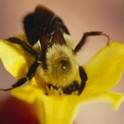
Traits that are attractive to mutualists may also attract antagonists, resulting in conflicting selection pressures. Here we develop the idea that increased floral nectar production can, in some cases, increase herbivory. In these situations, selection for increased nectar production to attract pollinators may be constrained by a linked cost of herbivore attraction. In support of this hypothesis, we report that experimentally supplementing nectar rewards in Datura stramonium led to increased oviposition by Manduca sexta, a sphingid moth that pollinates flowers, but whose larvae feed on leaf tissue. We speculate that nectar composition may provide information about plant nutritional status or defense that floral visitors could use to make oviposition decisions. Thus, selection by floral visitors and leaf herbivores may be inextricably intertwined, and herbivores may represent a relatively unexplored agent of selection on nectar traits.
- Datura stramonium,
- herbivory,
- Manduca sexta,
- mutualism,
- natural selection,
- nectar composition,
- nectar reward,
- oviposition,
- pollination
Available at: http://works.bepress.com/lynn_adler/13/
